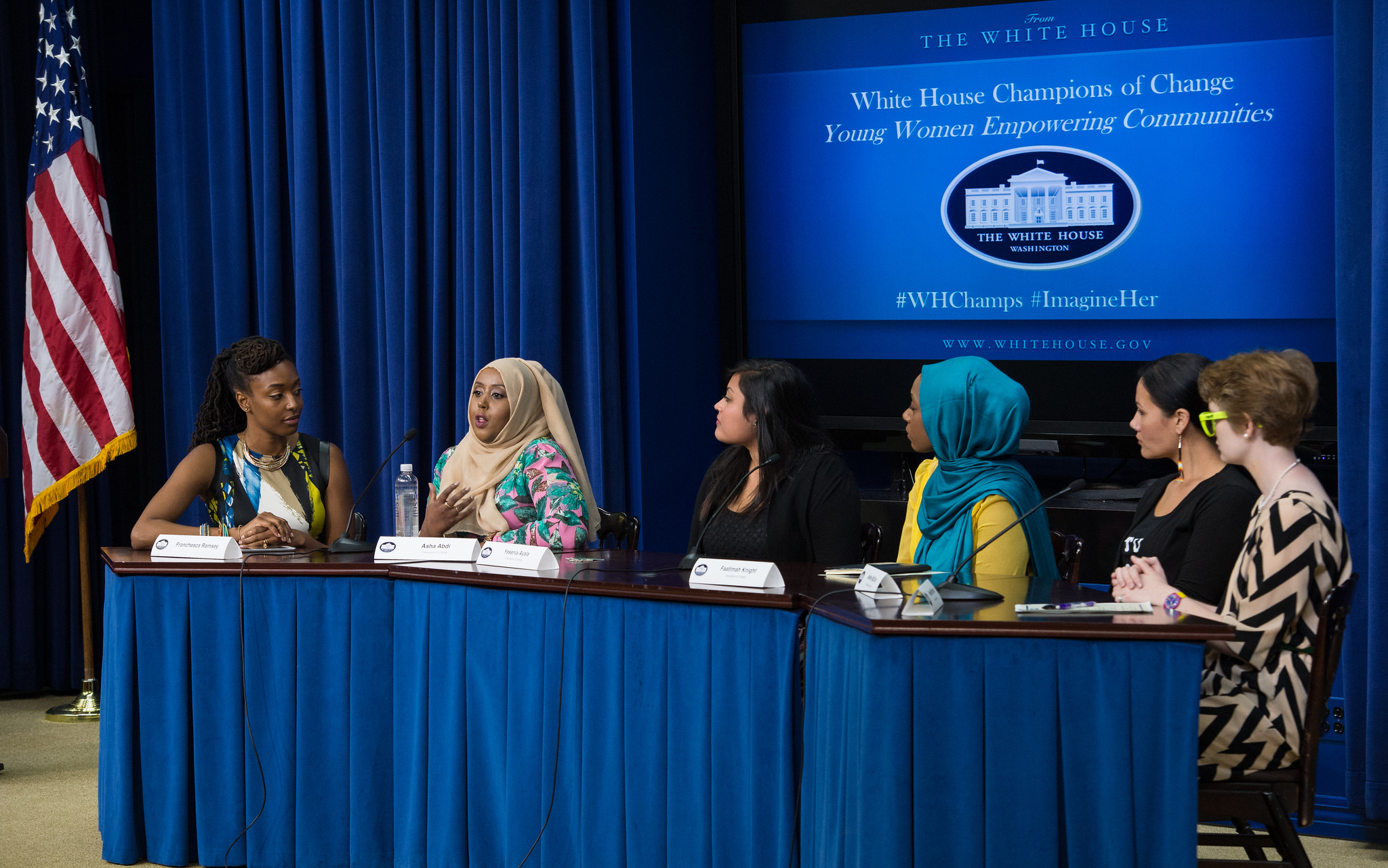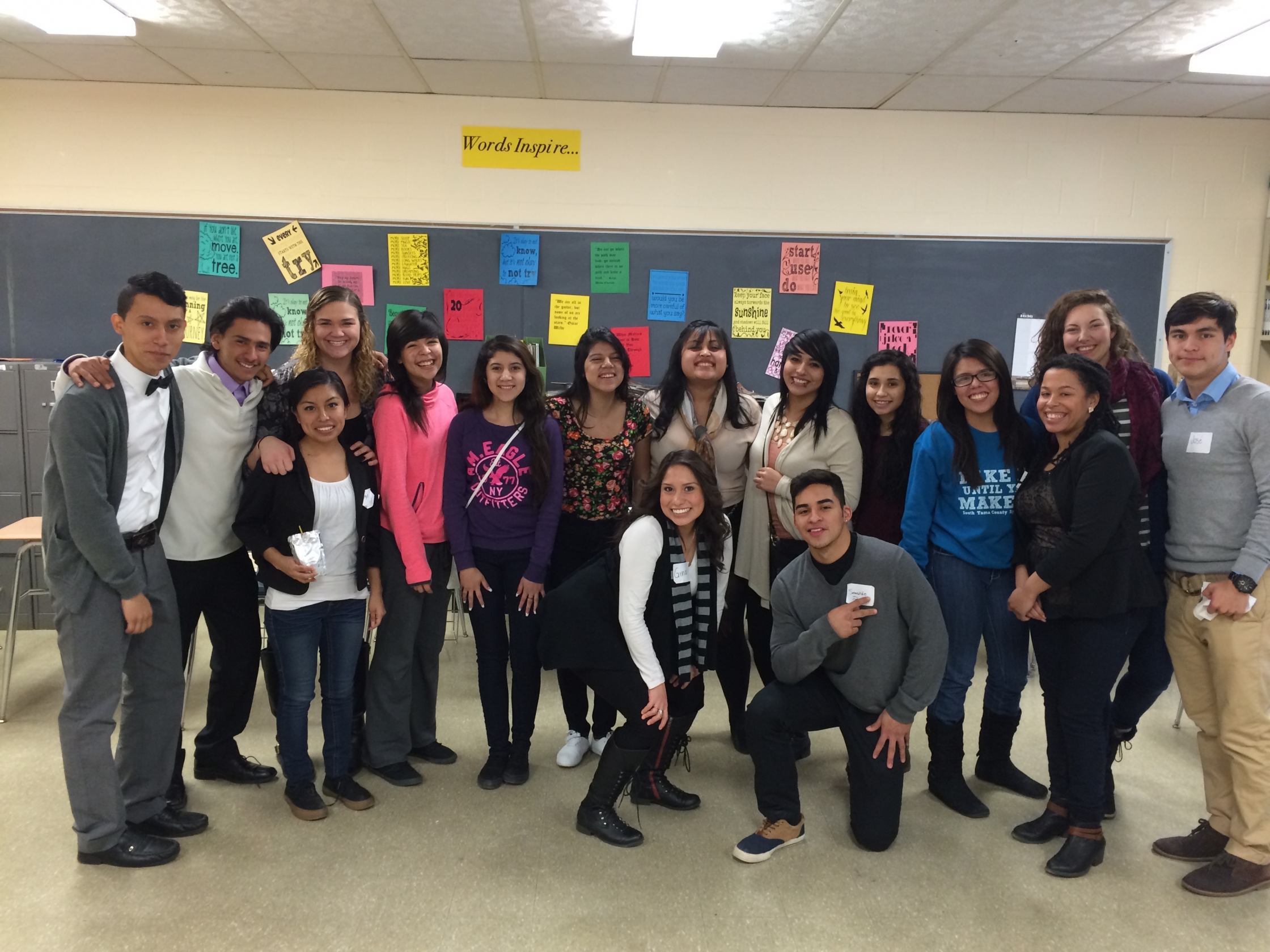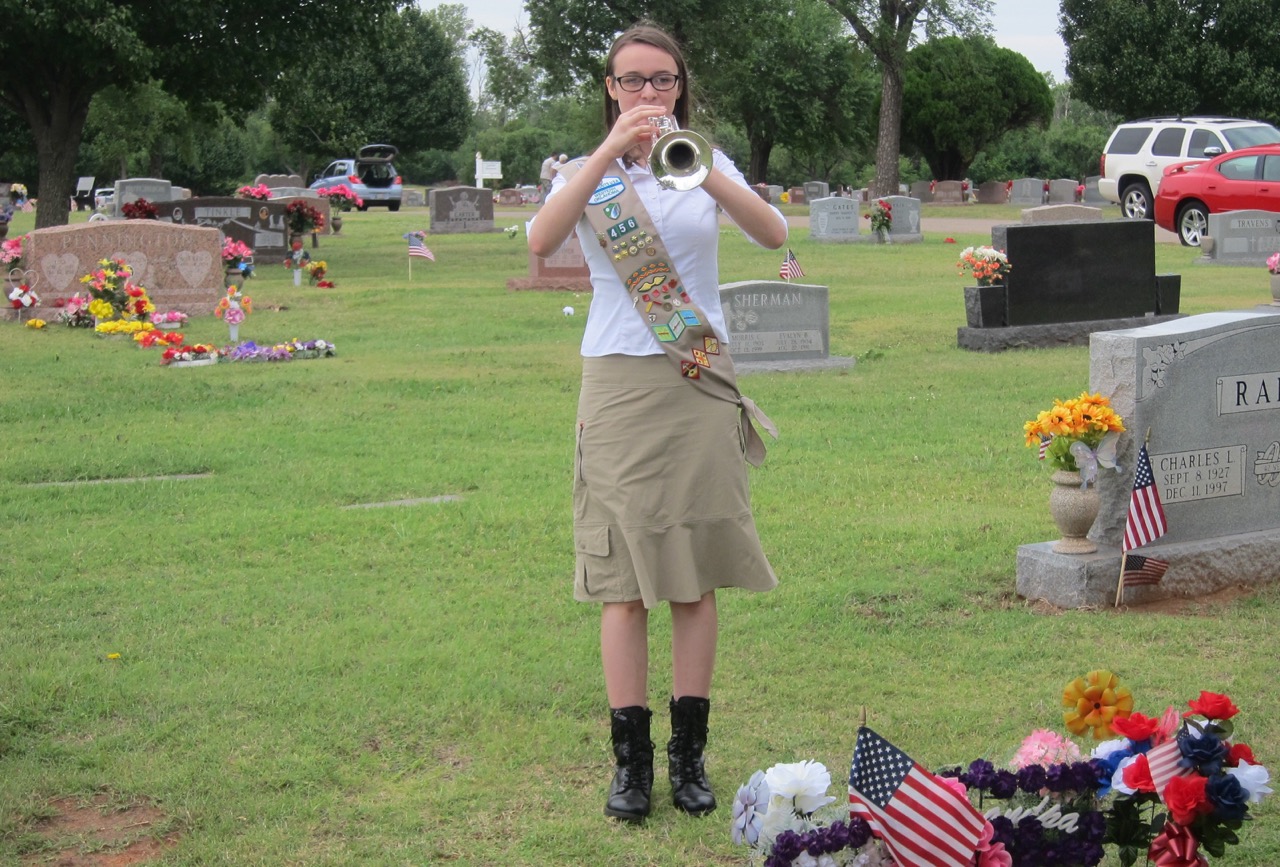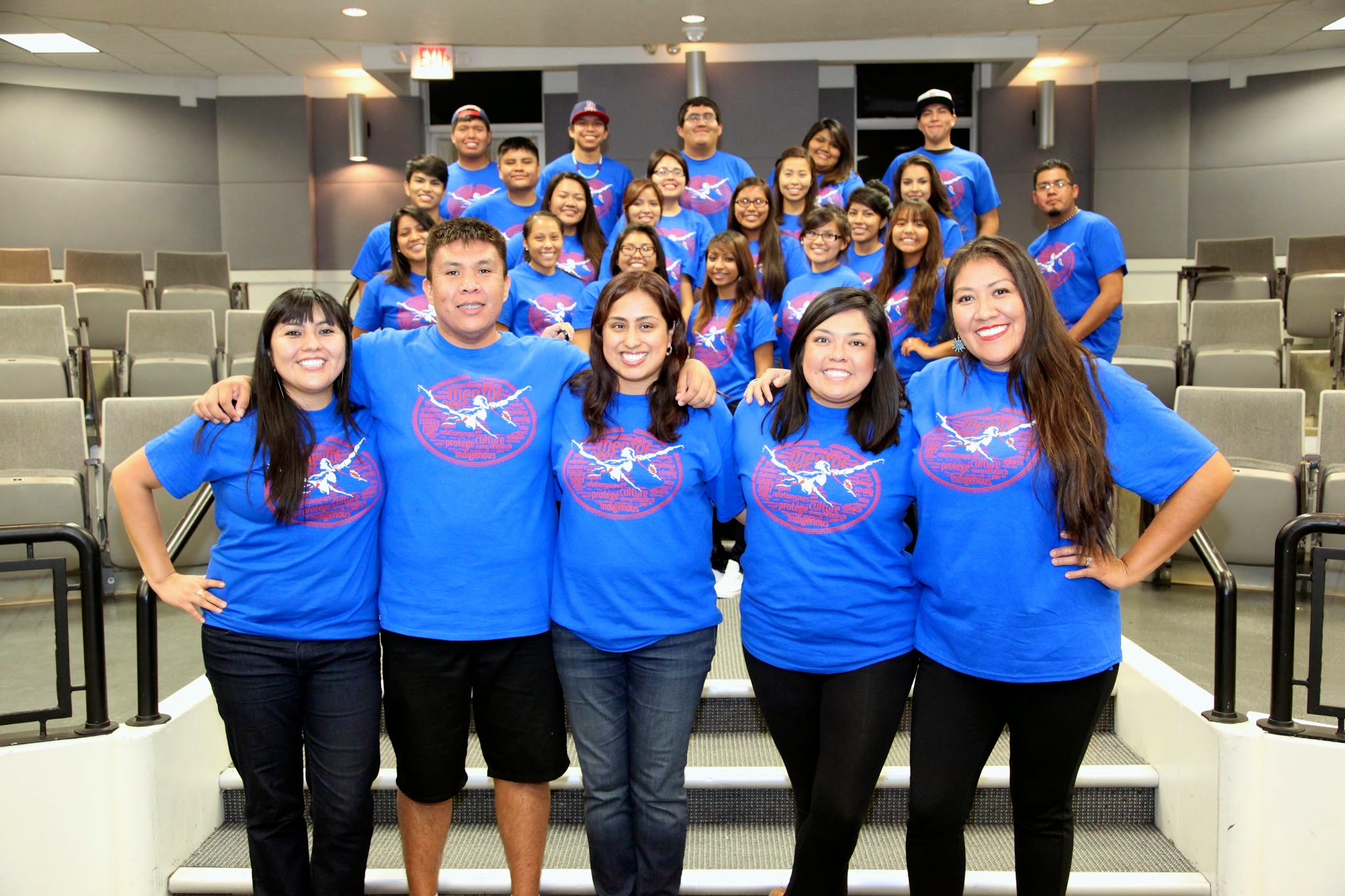
On Tuesday, the White House honored 11 young women who are leading and empowering their communities as Champions of Change. The program brought together young women from diverse backgrounds to share their stories of leading in their communities. The young women spoke of how they found the strength to lead, to inspire others and of those work of mentors and teachers who they relied on for help.

As part of the event, the White House Office of Science and Technology Policy released an important an important new fact sheet on implicit bias and inclusive STEM education and in conjunction with the start of Hispanic Heritage Month, the White House Initiative on Educational Excellence published a new report “Fulfilling America’s Future: Latinas in the U.S., 2015.”
In addition, in support of inclusive STEM education, the Center for Gender Equity in Science and Technology (CGEST) at Arizona State University announced the National Academic STEM Collaborative, a network of 10 academic partners and nine organizational partners who have committed to identify and scale effective, evidence-based strategies to improve STEM diversity in the nation’s colleges and universities, with a focus on women and girls from under-represented communities.
To expand STEM mentoring to girls in underserved communities, The National Girls Collaborative announced EmpowerHer, an expansion of “The Connectory" (a portal offering one-stop shopping for over 11,000 STEM mentoring and afterschool programs across the United States). A new interactive map will make it easier for parents and teachers in Promise Zones, Choice Neighborhoods, and in cities served by the Administration’s Tech Hire Initiative to locate STEM mentoring opportunities. Additionally, Time Warner Cable and local partners have committed $100,000 towards a small grants competition to link mentors and girls.
To support affirmative visibility for girls and young women from underrepresented communities, the Smithsonian announced a special edition of it signature “Museum Day,” on March 12, 2016, which for the first time will be themed to “inspire the nation’s girls and young women of color.”
The Council on Women and Girls also highlighted a new webpage featuring information on advancing equity and empowerment for women and girls of color and their peers.
Before the event, the Champions shared their reflections with us:
Asha Abdi
I’ve always heard of the concept of repressed memories and feelings. I never thought I had any until the images of the 2011 famine had awoken a surge of feelings and pain I never knew existed. I was once a Somali child sitting under a make shift tent in a refugee camp on the coast of Kenya. It rained on the first night and the women were rushed to a nearby warehouse. I woke up in the middle of the night and couldn’t find my mother. I can still feel the pain of what seemingly felt like my heart dropping to my feet. I rushed outside screaming for her and once I barely passed the door, I heard her yell out for me, she was in a corner breast-feeding my little sister.
That first night is the reason why I have decided to focus my life on giving back to not only those back home in Somalia, but also to my local community and those less fortunate. My faith and history have taught me that I have to be grateful and thankful for what I have. I could still be in a refugee camp, just like the 500,000 Somali’s who make up the largest camp in the world in Northern Kenya.
I have chosen to live my life by using the tools and passions I have for community and resource development to support the youth, especially young women, to have the set of skills needed to be successful in the fast pace and competitive world of Silicon Valley and to also help build a solid foundation for as many people as I can in Somalia.
Asha Abdi is a Faith Relations Coordinator VISTA at Habitat for Humanity Greater San Francisco; as well as Director of Communications and Partnership with Agoon Foundation.
Diali Avila
When I was 17 years old, I became part of a community-based radio show, which consisted of segments about health, arts, education and advocacy. It was a way for us to talk about the issues that were happening around our community, as well as to celebrate the talent in the city. After a few years of being on-air, we started a non-profit organization to raise money for undocumented students -- youth who unfortunately are at the mercy of decision makers that at times make it harder for them to continue their education. So far, we have awarded close to $50,000 in scholarships.
People take control of their lives through education; this empowers them to make decisions on their health, their future, and much more. My work with Planned Parenthood started when I joined the Affordable Care Act campaign to help families and individuals enroll in health care. After the ACA campaign, I started working on a campaign to implement comprehensive sexuality education in high schools. Young people should have access to medically accurate sexual education; learn about consent and healthy relationships, as well as their own bodily autonomy. Education is power, and access is our right!
Diali Avila is an Outreach Organizer with Planned Parenthood Federation of America and founding member of the Isac Amaya Foundation.
Yesenia Ayala
When I was in high school, one person completely shaped the path I was going to take with my life. My English teacher, Mr. Mullarkey, challenged, motivated, and believed in me when nobody else did. I was working full time, helping my parents raise my siblings, and trying to keep on top of my academics at a predominantly Latino school in Los Angeles. My family doubted the importance of higher education, but with Mr. Mullarkey’s guidance, I learned of a new possible future: Posse and Grinnell College.

Yesenia Ayala is a second-year student at Grinnell College where she is pursuing a sociology and Spanish double major with a concentration in Latin American Studies.
Meredith Boyce
My name is Meredith Boyce, and I am an 18 year old computer science student who started a program to service computers for blind students who use them for school work. During the past four years, my life underwent major changes. In 2011, an arteriovenous malformation (a fancy word for a kind of brain aneurysm) burst in my brain, and I required emergency surgery to stop the bleeding. This ordeal left me with epilepsy, neuropathy, and a scarred optic nerve, which caused me to go mostly blind. I had been at a private school before this happened, but with my new disabilities, I required more assistance than that school could provide. I transferred to the South Carolina School for the Deaf and the Blind in the tenth grade and became a student at the Blind School’s mainstream program at Spartanburg High School.
With the assistance of the School for the Blind, I went on to succeed in all of my classes at Spartanburg High School and at Daniel Morgan Technology Center. I had learned about computers before my brain injury and still was in awe of their potential in the 10th grade. The School for the Blind needed help taking care of the aging laptop computers that some students used to complete school work. I started by servicing the computers of my fellow mainstream students and teaching them how to utilize their assistive software to its fullest capacities, but it grew into a larger venture when students back at the main campus of the School for the Blind came to me for small repairs and help. I spent hours every week running diagnostics and doing repairs on students’ computers in the tenth grade. I did all of this while taking all honors classes and learning to read Braille because my vision was still declining.
In the eleventh grade, I enrolled in the partnership program at Daniel Morgan Technology Center through Spartanburg High School and was the only girl in the computer science department. I took the computer repair class because I thought that I should probably get some formal training if I was going to continue working on the blind students’ computers. It wasn’t easy being the only girl and the only person with a disability at Daniel Morgan Technology Center. I remember a substitute teacher asking me if I was lost when I walked into the room because, “cosmetology is down the hall, sweetie.” (Gender inequality doesn’t suddenly right itself as soon as one girl enrolls in a male-dominated field.)
At the same time, Spartanburg High School started a program where they assigned each student a MacBook Air. There was a learning curve for every student, but especially for the visually impaired mainstream students who were accustomed to using assistive software on their old PCs. I didn’t know how to teach my peers about VoiceOver or Zoom because I had never used them myself. I screwed up a lot at first, but eventually I got the hang of it and was able to teach my friends how to use the new software.
By the twelfth grade, the School for the Blind implemented the same program as Spartanburg High School and got MacBook Airs for each student. I was asked to advise the Blind School’s technology leader on what students would need to transition to Macs. I got to be a part of that transition as a peer technology coach and taught some on campus students how to work with their new devices. When I went over to the campus after school for Braille lessons or sports practices, there was always somebody who needed my help. I was happy to give it, even though it made me late for practice more than once.
I graduated this year from Spartanburg High School with honors and from the South Carolina School for the Deaf and the Blind as the Blind School student with the highest GPA. I am going to college in the same town as the Deaf and Blind School and I still plan to go back to campus and assist when I can.
Meredith Boyce is a student at Converse College in South Carolina.
Rita Herford
Growing up on a family farm I never put much thought into how our food was made. I was always involved in agriculture, so I knew the farm to fork journey. After returning home to my farm after college it became clear to me that a large percent of the population had little knowledge of how farms like mine grow safe, quality and affordable food for the rest of the world.
I feel very passionate about agriculture and helping consumers connect with farmers to learn where the ingredients that make up their foods come from. I am utilizing social media, giving farm tours, and partnering with organizations such as Farm Bureau and The American Society of Sugar Beet Technologist (ASSBT) to help drive transparency about our farm.
Our farm, like thousands across the U.S. strive to produce quality, safe and affordable food while using sustainable farming practices. Water and soil quality are very important at our farm, not only for us now, but so many more generations can enjoy the land. Being a Michigan Agriculture Environmental Assurance Program (MAEAP) verified farm is one way we make sure we are being sustainable. We are also part of the Kellogg’s Origins Great Lakes Program, measuring continuous improvement on our farm as we strive to optimize our practices.
Rita Herford is a farmer from Michigan where she grows wheat, sugar beets, corn, dry edible beans and soybeans with her family.
Faatimah Knight
I was born in Brooklyn, New York in the neighborhood of Flatbush that was, and still is, colored by the Caribbean immigrant experience. All my life my mother taught, counseled and advocated for workers’ rights in her union and my father also taught and worked as a health care practitioner. Since childhood I had in my parents’ examples that good work was work that benefited other people.
There were so many reasons behind why I started the Respond with Love campaign to help rebuild black churches burned down by arsonists in the South. I had the somewhat-rare blessing of a good idea coming to me at a very prudent time. The greater blessing, however, was having the conviction to follow through, the people to partner with, and the providence to be successful.
In the wake of the attack at the Emanuel AME Church in Charleston, the South saw a number of black churches burned by arsonists. Some feared that these attacks were in direct relation to the shooting at Emanuel AME and to the killer’s call for a race war. These fires were reminiscent of very old tactics to intimidate black communities across the South. Such a thing would take our country back to an era of unimaginable violence and ignorance. I felt compelled to do something that would take a stand against hate. I wanted to show myself that I did have to be crippled in fear and sadness by the hateful acts of others. The campaign raised over $100,000 in under three weeks, making it successful beyond my team’s wildest imagination. Most of the donors were individual Muslims from all over the country who were moved deeply to help.
As a black American Muslim I am implicated in anti-black racist violence. I am blessed to have so many intersections in my identity that although they make me a triple minority, also serve to broaden my scope in the best of ways. The values my parents instilled in me growing up in a Muslim home, as well as the edification I received in my religious and liberal arts education at Zaytuna College continue to inspire me to serve others with whatever small gifts I have been given. My hope is to continue to make a positive impact—especially in the lives of the vulnerable—through my writing and advocacy work.
Faatimah Knight is pursuing her Masters in Religious Studies at Chicago Theological Seminary. She has her Bachelors in Islamic Law and Theology from Zaytuna College.
Ashley McCray
At my university there is a severe underrepresentation of native students, faculty, and administrative staff. Enrollment of native-identifying students has steadily decreased since 2012. My work seeks to challenge and shift the university's views regarding native contributions. Specifically, I fight for curriculum reform, for diversity and inclusivity in syllabi and classrooms, ongoing education regarding native issues and issues that affect other marginalized and oppressed communities for all incoming students, faculty, staff, and administration.
I come from a long line of strong native women who have overcome obstacles such as extreme poverty, alcohol and drug dependency, domestic violence, and sexual assault. My mother's family comes from the Pine Ridge Indian Reservation in South Dakota.
Many of my grandmothers and aunts were and remain instrumental to the fight for native rights and thus I see my activism as an extension of their work. I strive to carry forth my ancestor's memories, struggles, stories, and acts of resistance to pave a better path for my people.
Ashley Nicole McCray is a Ph.D. student in the History of Science, Technology, and Medicine program at the University of Oklahoma, where she studies indigenous knowledge and serves her department as a graduate assistant.
Swetha Prabakaran
I would never have entered computer science if I hadn’t seen powerful women in this field from an early age, such as my mother and my freshman Computer Science teacher. Being able to see women I admired and looked up to in this space gave me the confidence I needed to pursue my love for computer science.
By 2020, we’ll have more than 1.4 million tech jobs in the US, but girls still hesitate to enter engineering and technology due to stereotypes. Without encouraging more young women to enter programming, we will never be able to fill those positions.
It was in that moment that my non-profit, Everybody Code Now!, was born. When I took my first Computer Science class in high school, I didn’t think that one day I’d be the one teaching kids to code. I really wanted other girls to have strong mentors and exposure to tech the way I did.
Through Everybody Code Now!, I’ve been able to teach hundreds of kids to code and raise thousands of dollars to run more science and engineering activities in schools. I’ve seen elementary school girls who had never heard of programming blossom into confident students building websites about their favorite sports or animals and watched the quietest students become the classroom leaders.
I hope to continue expanding Everybody Code Now!’s programs, both nationally and internationally, and show even more girls that they can become community leaders, innovators, and Champions of Change.
Swetha Prabakaran is a junior at Thomas Jefferson High School for Science and Technology with a focus on Computer Science. She is the Founder and Executive Director of Everybody Code Now!
Katie Prior
The year I started playing the trumpet, my great-grandfather, a World War II Army veteran, was in hospice care. My family talked about how great it would be if I could play Taps at his funeral, but he passed away before I had a chance to learn the notes.
Five years later, I learned that many veterans’ funerals have an audio recording of Taps because there aren’t enough military trumpet players available for every funeral. I realized that this was an issue I could do something about! I could use my trumpet for more than just performing for my parents at band concerts. I decided to recruit my trumpet-playing friends to help, too.
Experiencing the effect that live Taps has is truly inspiring. As anyone who has lost a veteran loved one can tell you, the final salute of Taps is something that stays with you long after the ceremony. Every time you hear Taps for the rest of your life, it reminds you of that loved one and the sacrifices they made for our country.

This is why I founded the Youth Trumpet & Taps Corps. We are a non-profit service organization that trains, supports, and recognizes high school trumpet players who use their musical gifts to honor the veteran community. We now have volunteers in 6 states and plans to expand nationwide.
I hope to inspire my peers to use their own gifts, whatever those gifts may be, to serve others and make the world a better place.
Katie Prior is a tenth-grade student from Oklahoma who earned her Girl Scout Gold Award for founding the Youth Trumpet & Taps Corps.
Amanda Tachine
I come from a land of juniper and pinon trees, beautiful yucca plants, and a breath-taking array of mesas, canyons, and valleys. I come from a lineage of strong and courageous Navajo people, who laugh, love, hope and pray. I am a Navajo mother, wife, daughter, granddaughter, teacher, writer, and advocate. Where I am from and whom I am connected to influences the way I live my life.
My passion and vision is to inspire and increase Native peoples’ attainment of a college degree. I believe that higher education is a means toward the betterment of our tribal nations and society at large. To help achieve that vision, Helios Education Foundation, University of Arizona, Tohono O’odham Nation, Pascua Yaqui Nation, and the Navajo Nation supported efforts to implement Native SOAR (Student Outreach, Access, and Resiliency), a mentoring program that strives to increase college aspirations and attainment for Native Americans. When higher education institutions work closely with Native communities, they have a powerful role in creating positive change for Native peoples and tribal nations. Currently, I am grateful to be a Postdoctoral Scholar at the Center for Indian Education at Arizona State University where in which I look forward to advancing efforts to increase Native peoples’ dreams of receiving a college degree.
Dr. Amanda R. Tachine is a Postdoctoral Scholar at the Center for Indian Education at Arizona State University.
If you would like to continue the conversation, you can share your story on StoryCorps.me, YouTube, Vimeo or other online sharing services using #ImagineHer.
Katharine Gallogly is a special assistant in the White House Office of Public Engagement



